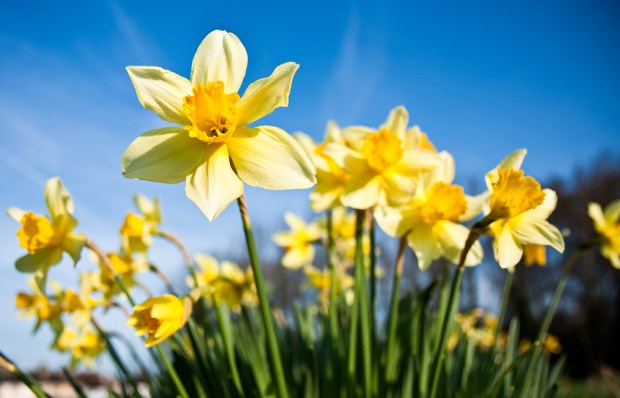In Competition No. 3271, you were invited to submit a poem about the Oxford comma.
Thérèse Coffey’s much-maligned edict about this divisive piece of punctuation seems a long time ago now, but your entries – tremendous; well done – brought it all back.
Though my head was turned by Frank McDonald’s villanelle, John O’Byrne’s haiku and Janine Beacham’s double dactyl, it’s the winners below who scoop £30.
A memo arrived in the Coffey break
for departmental circulation:
‘Whatever else may be at stake,
the priority’s good punctuation.‘The NHS will have to wait,
I fear this task has proved more pressing,
I’ll set aside affairs of state,
the Oxford comma needs addressing.‘I plan to ban it – no regret,
for since promotion I’ve a rod
to rule with – mindful of the debt
I owe my parents, Liz and God.’And in the shadows someone hissed,
‘Beware of being too pedantic,
an absent comma in a list
can yield a faux pas that’s gigantic.’
Sylvia Fairley
The Oxford comma? There’s a thing
That strikes me as san fairy ann,
Yet it’s the cause of quarrelling
If you’re a strict grammarian.Let nerds and pedants toil away,
Constructing ropes of sand.
A larger question, I would say,
Is why the useless ‘and’?Myself, I find I’ve often built
A mounting sense of crisis,
Jeopardy, horror, madness, guilt,
With serial comma splices.Why should the orthodox dictate
How punctuation functions?
Arise, protest, march, demonstrate.
Free commas from conjunctions.
Basil Ransome-Davies
I am an Oxford Comma and I’m expert in the art
of separating clauses that are better kept apart.
My presence in a sentence isn’t rigidly decreed;
I’m invited by a writer as an answer to a need.When brought about, I carry out a necessary function
that clarifies an otherwise ambiguous conjunction.
I may be seen to stand between two nouns that sit together
to emphasise a verb applies to one and not the other.In many cryptic listings I am all but indispensable
in tweaking what-the-Dickenses to make them comprehensible.
For years I’ve served my purpose as explainer to the nation
and now this Jill-in-office calls for my annihilation.I cannot help but wonder if she’d care to do the same
to the little diacriticals that decorate her name
as lumbering encumbrances, and whether that would please her,
bringing her joy when hoi polloi address her as ‘Tereezer’.
Ann Drysdale
The punctuo-philiacs’ primary strop
is apostrophe use in the greengrocer’s shop;
but second for getting their pants in a twist
is the comma before the last ‘and’ in a list.Bestriding their world of grammatical peeves
is the psychopath panda who eats, shoots, and leaves;
but the heart of the pedant is almost as cleft
by the poisonous partridge who ate shot, and left.Though paupers and princes respectively hasten
for bargains in Aldi and Fortnum and Mason,
some care with the comma seems less high-falutin’
when searching for gouache in Windsor, and Newton.It remains to inscribe this syntactical stew
of piebald assassins ingesting bamboo,
Oxonian commas, and phrases mis-spliced,
with love to my parents, Gwyn Paltrow and Christ.
Nick MacKinnon
‘The woods are lovely, dark and deep…’ was good enough for Frost
‘It needs the Oxford comma,’ was the editor’s riposte,
But Frost would not agree with him no matter what the cost
And still the verse became a great success.Why is it that the Oxford comma causes such a fuss?
The scholar says its absence makes a phrase ambiguous:
‘I really like my parents, Boris Johnson and Liz Truss’
Could prompt some startling headlines in the press!The pros and cons and arguments can drive one to the brink,
A list of items needs the Oxford comma, pedants think,
While others say to put one in is just a waste of ink
You pays your cash and takes your choice I guess.It could be that the reason for this wild debate’s attraction
Is simply that it offers us a much desired distraction
From the rising cost of living, the collapsing pound’s contraction,
And the country’s current economic mess!
Alan Millard
No. 3274: beyond the cringe
It’s toe-curlingly bad analogy time (up to eight each). Here’s a winner, courtesy of Chris O’Carroll, from a previous contest: ‘He broke wind with the menacing thunder of ancestral voices not only prophesying war, but actually launching a poison gas attack to get the hostilities started.’ Please email entries to lucy@spectator by midday on 2 November.
Got something to add? Join the discussion and comment below.
Get 10 issues for just $10
Subscribe to The Spectator Australia today for the next 10 magazine issues, plus full online access, for just $10.
You might disagree with half of it, but you’ll enjoy reading all of it. Try your first month for free, then just $2 a week for the remainder of your first year.














Comments
Don't miss out
Join the conversation with other Spectator Australia readers. Subscribe to leave a comment.
SUBSCRIBEAlready a subscriber? Log in